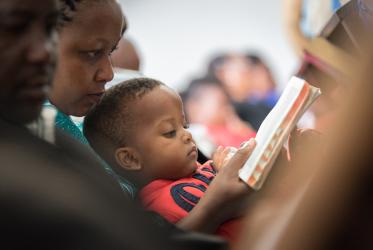Churches can make a huge difference in children’s lives and therefore improve the whole community, strongly believes Frederique Seidel, World Council of Churches (WCC) special advisor on children’s rights. To help the churches in their efforts in improving the wellbeing of children, WCC has published this year the invitation and resource for churches, “Churches’ Commitments to Children”.
Over a period of 15 months WCC has led a broad consultative process among member churches and partners about how churches can use their influence to improve children’s lives. The process was initiated by the WCC Commission of Churches on International Affairs and included theologians, child rights experts and children themselves. It led to the “Churches’ Commitments to Children”, an open invitation and living resource for the ecumenical commitment to child wellbeing.
“It is necessary for the churches to pay special attention to children's wellbeing because it's a way of translating our faith into concrete actions”, says Seidel. “Many studies show that what is done for children benefits all in the community. Any structures or systems which are put in place for children ultimately improve the quality of the well-being of members of the community of any age – it is just the most strategic investment.”
Christians are called to care for the weakest and most vulnerable who have less of a voice. Churches are closer to the reality of children and their families than nearly any other actor in society can be in such an organized way, notes Seidel. “In many countries, those who are particularly anchored in the community, who know exactly what's happening where and what is the daily life of children even in most remote places - are pastors and the church communities. Churches can really make a huge difference in children's lives. That's why we see so many requests from partners to help us reach out to the most hard-to-reach children”, recalls Seidel.
One of the three main areas “Churches’ Commitments to Children” encourages people to improve is child protection. Many of the participants in the consultation process insisted that first we need to make sure that “the churches are safe places and safe communities. Prevention of any abuse of children within the church is the precondition of anything else”. In cooperation with UNICEF, other non-governmental organizations (NGOs) and church agencies, an extensive collection of good practices of safeguarding policies and their implementation is gathered, and WCC has very qualified counterparts who can help any church which wants it to improve its safeguarding policy or to develop one.
“Churches’ Commitments to Children” also promotes a meaningful participation of children in church worship and activities. “A lot of children are coming to the church in many countries, but we often hear in the surveys and meetings that they are bored there and they don't feel the church is relevant for them”, says Seidel. “In many cases much more could be done to make it attractive for children to come to church - not just to be disciplined or to come to obey a certain tradition, but to really spark in them the dialogue with God and to develop the habit of praying. It is very important that the churches from the earliest age on make children feel at home in the church.”
One of the key milestones in developing “Churches’ Commitments to Children” was a 2-day meeting held with a group of 13 theologians from member churches around the world in April 2016. “These scholars discerned the theological grounding of the commitments, explaining the need to prioritize children and young people from a theological perspective”, explains Seidel, who is also very grateful for close collaboration with the Child Theology Movement and its directors, Keith White and Prof. Dr Marcia Bunge.
The starting point for developing “Churches’ Commitments to Children” goes back to the 10th WCC Assembly in Busan, Republic of Korea, where a strong request to the WCC to support churches and their efforts for children was expressed. The process started with the recognition that there was so much suffering of children in the world and responsibility of the churches to respond to that, recalls Seidel. “From all the comments and suggestions in the process, all the energy and enthusiasm out there around the Commitments - I think these joint efforts have a lot to do with the renewal of the church.”
“Because it's about investing into the generation of young people who will be faced with huge challenges in the world. By giving them more attention in the church, they will grow into stronger adults. They will have a stronger faith and they will be able to cope better with what's coming up in the next decades. So it's absolutely necessary - and we also see that it works well if churches proactively consider the needs of children in their planning.”Churches’ Commitments to Children” is not a policy or static document - it is rather an open invitation for all churches to consider and adapt by making these commitments their own.
”It is much more promising than a policy because it is a dynamic which builds on something from within the church, encouraging everyone to work together on this and overcome the dogmatic differences, focusing on the joint challenges of the situation of children”, notes Seidel, assuring that it is possible for churches to add their ideas and their way of doing things, so the process can be tailored to any context.
Churches are encouraged to look at the most urgent tasks in their context, and whether those tasks relate to child soldiers, or domestic violence, or child poverty, assessing the concrete local national environment. Then, churches can use the commitments to find help from outside and become even stronger in their response, or to offer their support to some smaller churches in need of it.
In order to coordinate support among the churches, dissemination of “Churches’ Commitments to Children” is accompanied with an online survey. “Each church is encouraged to let us know for which commitment they feel already strong and experienced, and would they like to share their experience and resources with others. And to let us know if they have some objectives related to the Commitments to Children for which they would appreciate support,” says Seidel.
In response to the very high number of responses already received to this survey, the WCC is developing an online platform to facilitate networking and collaboration among churches and partners in the implementation.
“Through this online platform, we will promote joint efforts that foster all churches’ capacity to support children,” says Seidel. “Similar to the concept of ‘twin towns’ or ‘sister cities’, this platform will support member churches in identifying possible partners, depending on what their priorities are in the response to the challenges faced by children in their specific countries and regions. This will be a concrete way to undertake the Pilgrimage of Justice and Peace, and contribute at the same time to churches’ unity.”
All churches which would like to take part in this initiative are warmly invited to share their information through online survey.
To further the invitation of general secretary Rev. Dr Olav Fykse Tveit to all member churches to join the “Churches’ Commitments to Children” initiative, a guide “Churches promoting meaningful child participation”
is available for churches. A set of suggestions, background materials and templates for consultations were developed to engage children/youth in the implementation of the Churches’ Commitments to Children - and can be downloaded from WCC website.
Learn more about WCC’s engagement for children
Download “Churches’ Commitments to Children”
”Churches’ Commitments to Children” poster
Guide “Churches promoting meaningful child participation”
Resources and tools available for the implementation of Churches’ Commitments to Children






